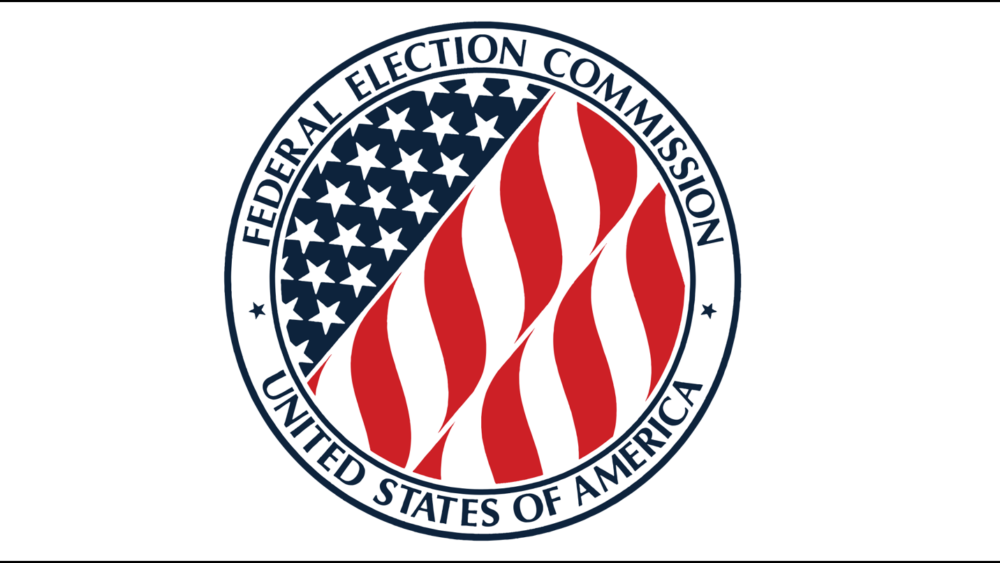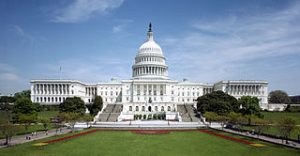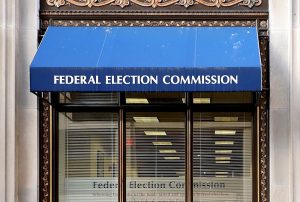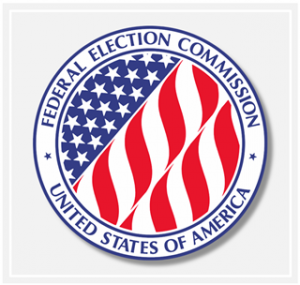September 10, 2019 •
FEC Seeks Comments on National Party Committee Segregated Accounts

The Federal Election Commission (FEC) is seeking public comments on proposals for rules requiring national party committees to report receipts and disbursements for their segregated accounts. These comments must be submitted on or before October 28, 2019. A petition filed […]
The Federal Election Commission (FEC) is seeking public comments on proposals for rules requiring national party committees to report receipts and disbursements for their segregated accounts.
These comments must be submitted on or before October 28, 2019.
A petition filed by the Campaign Legal Center and the Center for Responsive Politics made a request to the FEC.
The request stated the national party committees report their receipts to and disbursements from the accounts in “inconsistent and insufficient ways,” making the public unable to clearly determine the amounts of money received and disbursed from the segregated accounts.
The notice of availability for the submission of public comments was issued in the August 28 Federal Register.
August 26, 2019 •
FEC to Lose Quorum on August 31
On August 31, Federal Election Commission (FEC) Vice Chairman Matthew Petersen will leave the agency, resulting in an FEC without the minimum quorum of four commissioners to make decisions on regulations or enforcements. The FEC requires at least four commissioners […]
On August 31, Federal Election Commission (FEC) Vice Chairman Matthew Petersen will leave the agency, resulting in an FEC without the minimum quorum of four commissioners to make decisions on regulations or enforcements.
The FEC requires at least four commissioners to agree for any official action.
Peterson, who has served on the FEC for 11 years, announced his resignation on August 26 with a letter to the President Trump without stating a reason for his leaving.
A replacement for Petersen, a Republican, must be selected by the president and then confirmed by the U.S. Senate.
No more than three members of the FEC may be registered with the same political party.
The remaining FEC commissioners will be Chair Ellen L. Weintraub, a Democrat, Caroline C. Hunter, a Republican, and Steven T. Walther, an Independent.
On July 11, the Federal Election Commission (FEC) issued three Advisory Opinions addressing diverse campaign finance issues. In Advisory Opinion 2019-08, the FEC found a campaign committee was free to distribute digital blockchain tokens, having no monetary values, to volunteers […]
On July 11, the Federal Election Commission (FEC) issued three Advisory Opinions addressing diverse campaign finance issues.
In Advisory Opinion 2019-08, the FEC found a campaign committee was free to distribute digital blockchain tokens, having no monetary values, to volunteers and supporters as incentives for those individual to participate in campaign activities. The Commission concluded the tokens do not constitute compensation, but rather are “materially indistinguishable” from traditional forms of campaign souvenirs.
In Advisory Opinion 2019-09, the FEC determined a nonconnected political committee may sell t-shirts bearing the facial likenesses and names of certain candidates because the committee intends on treating the entire purchase price of the t-shirts as contributions falling under regular campaign finance reporting requirements and contribution limits.
In the third decision issued, Advisory Opinion 2019-12, the FEC said it is permissible for a corporation to offer cybersecurity services to federal candidates and political committees under a “low to no cost” pricing tier that the corporation offers to all qualified non-political customers in the ordinary course of business. The FEC concluded the proposal would not be considered an in-kind contribution.
May 22, 2019 •
FEC Names Tony Baptiste as Acting Inspector General
On May 28, the Federal Election Commission (FEC) announced the appointment of Tony Baptiste as Acting Inspector General of the agency. Mr. Baptiste, who has worked with the Office of the Inspector General for 19 years, will leave his position […]
On May 28, the Federal Election Commission (FEC) announced the appointment of Tony Baptiste as Acting Inspector General of the agency.
Mr. Baptiste, who has worked with the Office of the Inspector General for 19 years, will leave his position at the Commodity Futures Trading Commission.
“We look forward to working with him and drawing upon his deep expertise,” said Chair Ellen L. Weintraub in the FEC’s press release.
His appointment with the FEC becomes effective on May 28.
March 22, 2019 •
Federal Court Rules Concerning Unauthorized Committee Naming
On March 21, a federal court ruled an unconnected committee is not restricted from using candidates’ names in the titles of their websites and social media pages. In Pursuing America’s Greatness v. FEC, the United States District Court for the […]
 On March 21, a federal court ruled an unconnected committee is not restricted from using candidates’ names in the titles of their websites and social media pages.
On March 21, a federal court ruled an unconnected committee is not restricted from using candidates’ names in the titles of their websites and social media pages.
In Pursuing America’s Greatness v. FEC, the United States District Court for the District of Columbia granted the plaintiff’s motion for summary judgment and denied the motion for summary judgment from the Federal Election Commission (FEC).
The court ruled 11 C.F.R. § 102.14(a) unconstitutional and permanently enjoined the FEC from enforcing the application of 11 C.F.R. § 102.14(a).
Federal law requires a candidate’s committee to include the name of the candidate in the committee’s title and requires an unauthorized political committee to not use a candidate’s name in its title. The purpose of the law is to avoid confusion.
Through the regulation, the FEC had extended the naming prohibition to other committee activities, solicitations, and communications, including special project names for websites or social media pages.
The court found the regulation violates the First Amendment and the FEC had not shown the regulation is the least restrictive means of achieving the government’s interest.
February 27, 2019 •
U.S. House Administration Committee Approves of Campaign Finance and Ethics Legislation
On February 26, legislation aimed at reforming U.S. campaign finance, lobbying, and ethic laws advanced in committee. The House Administration Committee approved of H.R. 1, the For the People Act, by a party-line vote of six to three. In the […]
 On February 26, legislation aimed at reforming U.S. campaign finance, lobbying, and ethic laws advanced in committee. The House Administration Committee approved of H.R. 1, the For the People Act, by a party-line vote of six to three.
On February 26, legislation aimed at reforming U.S. campaign finance, lobbying, and ethic laws advanced in committee. The House Administration Committee approved of H.R. 1, the For the People Act, by a party-line vote of six to three.
In the sweeping 571-page bill, corporate PACs would be required to make certifications annually with the Federal Election Commission. Those certifications would include affirming under penalty of law no foreign national participated in any way in the decision-making processes of the PAC; corporate board members who are foreign nationals abstained from voting on matters concerning the corporation’s PAC; and the PAC did not solicit or accept recommendations from any foreign national.
The legislation expands the definition of foreign national to include any corporation, limited liability corporation, or partnership that is not a foreign national but is owned or indirectly controlled by foreign nationals meeting statutory thresholds of ownership or voting. The threshold is five percent of voting shares if the foreign national is a foreign country, a foreign government official, or a corporation principally owned or controlled by a foreign country or foreign government official. The threshold is 20 percent if the foreign national is any other type of foreign national. Corporations not considered foreign nationals would fall under the definition when a foreign national has the power to direct, dictate, or control the decision-making process of the corporation with respect to its interests in the United States or with respect to activities in connection with federal, state, or local elections.
Additionally, the bill restructures the Federal Election Commission, amends the federal conflict of interest law, and expands the revolving door provision by prohibiting Members of Congress from serving on corporate boards. Introduced by Rep. John Sarbanes, the bill requires any organization involved in political activity to disclose its largest donors, creates a multiple matching system for small donations for political campaigns, and amends rules governing super PACs.
If passed, the bill also requires presidential candidates to disclose their tax returns, prohibits partisan gerrymandering, increases oversight over election vendors, creates an automatic voter registration across the country, and changes registration requirements for lobbyists and foreign agents.
February 11, 2019 •
NYCU Video Digest – February 11, 2019
Happy Monday! Four stories from last week about new lobbying laws, campaign finance limits and gift laws you don’t want to miss!
Happy Monday! Four stories from last week about new lobbying laws, campaign finance limits and gift laws you don’t want to miss!
February 7, 2019 •
Federal Lobbyist Bundling Disclosure Threshold Increased to $18,700
Today, the Federal Election Commission (FEC) published its price index adjustments for expenditure limitations and the federal lobbyist bundling disclosure threshold. The lobbyist bundling disclosure threshold has increased for 2019 from $18,200 to $18,700. This threshold amount is adjusted annually. […]
 Today, the Federal Election Commission (FEC) published its price index adjustments for expenditure limitations and the federal lobbyist bundling disclosure threshold.
Today, the Federal Election Commission (FEC) published its price index adjustments for expenditure limitations and the federal lobbyist bundling disclosure threshold.
The lobbyist bundling disclosure threshold has increased for 2019 from $18,200 to $18,700. This threshold amount is adjusted annually.
Federal law requires authorized committees of federal candidates, leadership political action committees (PACs), and political party committees to disclose contributions bundled by lobbyists and lobbyists’ PACs.
Additionally, the FEC published its adjusted Coordinated Party Expenditure Limits for political parties for 2019.
February 7, 2019 •
Let the Fundraising Begin: FEC Publishes Contribution Limits for 2019-2020 Election Cycle
Today, the Federal Election Commission (FEC) published the 2019-2020 election cycle contribution limits, which have been indexed for inflation. As required by the Bipartisan Campaign Reform Act of 2002, the FEC must adjust certain contribution limits every two years. The […]
 Today, the Federal Election Commission (FEC) published the 2019-2020 election cycle contribution limits, which have been indexed for inflation.
Today, the Federal Election Commission (FEC) published the 2019-2020 election cycle contribution limits, which have been indexed for inflation.
As required by the Bipartisan Campaign Reform Act of 2002, the FEC must adjust certain contribution limits every two years.
The individual and nonmulticandidate PAC contribution limit to federal candidates has increased from $2,700 to $2,800 for both primary and general elections, allowing for a total of $5,600 for a federal candidate.
The limits on contributions by individuals to national party committees has increased from $33,900 to $35,500 per calendar year.
Individuals may now contribute $106,500 per calendar year to committees of a national political party for presidential nominating conventions, to committees of a national political party for preparation for and the conduct of election recounts and contests and other legal proceedings, and to committees of a national political party for the construction, purchase, renovation, operation, and furnishing of one or more buildings for party headquarters.
February 7, 2019 •
FEC Request for Comments on Comments Extended to March 4
The Federal Election Commission (FEC) has extended its deadline for seeking public comments on proposals for rules establishing specific time periods for the submission of public comments on drafts of advisory opinions. The comment period was originally scheduled to end […]
 The Federal Election Commission (FEC) has extended its deadline for seeking public comments on proposals for rules establishing specific time periods for the submission of public comments on drafts of advisory opinions.
The Federal Election Commission (FEC) has extended its deadline for seeking public comments on proposals for rules establishing specific time periods for the submission of public comments on drafts of advisory opinions.
The comment period was originally scheduled to end on February 1. Because of the recent partial government shutdown, the FEC chose to extend the comment period for 30 days, ending on March 4.
In 2016, a Petition for Rulemaking was received by the FEC requesting the Commission modify 11 CFR §112.3 and codify procedures establishing specific time periods for public comments on drafts of advisory opinions before the Commission votes on the drafts.
The petition, filed by Make Your Laws PAC, Inc., Make Your Laws Advocacy, Inc., Make Your Laws, Inc., and Dan Backer, Esq., additionally asks the Commission to amend existing regulations to require that, when the Commission makes public multiple drafts of an advisory opinion, the Commission indicate the differences between those drafts.
The FEC also extended the comment deadline to March 4 for the rulemaking concerning the regulatory definition of contribution.
After the comment period is over, the FEC will consider the merits of the petition.
January 7, 2019 •
First U.S. House Bill Introduced is Sweeping Campaign Finance Bill
The first piece of legislation introduced into the new U.S. House of Representative was a sweeping 571-page campaign finance bill. Introduced by Rep. John Sarbanes, House Bill 1, the For the People Act, requires any organization involved in political activity […]
 The first piece of legislation introduced into the new U.S. House of Representative was a sweeping 571-page campaign finance bill. Introduced by Rep. John Sarbanes, House Bill 1, the For the People Act, requires any organization involved in political activity to disclose its largest donors, creates a multiple matching system for small donations for political campaigns, and amends rules governing super PACs.
The first piece of legislation introduced into the new U.S. House of Representative was a sweeping 571-page campaign finance bill. Introduced by Rep. John Sarbanes, House Bill 1, the For the People Act, requires any organization involved in political activity to disclose its largest donors, creates a multiple matching system for small donations for political campaigns, and amends rules governing super PACs.
The bill also restructures the Federal Election Commission, amends the federal conflict of interest law, and expands the revolving door provision by prohibiting members of Congress from serving on corporate boards. If passed, the bill also requires presidential candidates to disclose their tax returns, prohibits partisan gerrymandering, increases oversight over election vendors, creates an automatic voter registration across the country, and changes registration requirements for lobbyists and foreign agents.
Sarbanes argued the rational for the bill in his press release, stating, “The bold, transformative set of reforms that we introduced today will strengthen our democracy and return political power to the people by making it easier, not harder, to vote, ending the dominance of big money in our politics and ensuring that public officials actually serve the public.”
December 12, 2018 •
FEC to Consider Whether Mining Cryptocurrencies Is Contribution
On December 13, the Federal Election Commission (FEC) may consider whether allowing an individual volunteering to allow the processing power of his or her internet-enabled device to mine cryptocurrencies for the benefit a political committee would be considered a political […]
 On December 13, the Federal Election Commission (FEC) may consider whether allowing an individual volunteering to allow the processing power of his or her internet-enabled device to mine cryptocurrencies for the benefit a political committee would be considered a political contribution.
On December 13, the Federal Election Commission (FEC) may consider whether allowing an individual volunteering to allow the processing power of his or her internet-enabled device to mine cryptocurrencies for the benefit a political committee would be considered a political contribution.
An advisory opinion request asks the FEC if a federal political committee could allow its individual supporters to volunteer the processing power of their internet-enabled devices to pool the processing power of these devices, which results in the mining of a “block.”
Mining allows transactions between users to be authenticated and generates a new cryptocurrency unit for the miner as a reward for creating the “block” and pays the miner a transaction fee. Creating blocks requires enormous amounts of computing power and can take years to generate a valid “block” by a single miner.
The FEC may consider Draft Advisory Opinion 2018-13 (Draft A) at its open meeting December 13, or hold it over for a future date.
December 10, 2018 •
FEC Seeks Comments on Comments
The Federal Election Commission (FEC) is seeking public comments on proposals for rules establishing specific time periods for the submission of public comments on drafts of advisory opinions. These comments must be submitted on or before February 1, 2019. In […]
 The Federal Election Commission (FEC) is seeking public comments on proposals for rules establishing specific time periods for the submission of public comments on drafts of advisory opinions. These comments must be submitted on or before February 1, 2019.
The Federal Election Commission (FEC) is seeking public comments on proposals for rules establishing specific time periods for the submission of public comments on drafts of advisory opinions. These comments must be submitted on or before February 1, 2019.
In 2016, a Petition for Rulemaking was received by the FEC requesting the Commission modify 11 CFR §112.3 and codify procedures establishing specific time periods for public comments on drafts of advisory opinions before the Commission votes on the drafts.
The petition, filed by Make Your Laws PAC, Inc., Make Your Laws Advocacy, Inc., Make Your Laws, Inc., and Dan Backer, Esq., additionally asks the Commission to amend existing regulations to require that, when the Commission makes public multiple drafts of an advisory opinion, the Commission indicate the differences between those drafts.
After the comment period is over, the FEC will consider the merits of the petition. The notice of availability for the submission of public comments was issued in the December 3 Federal Register.
November 19, 2018 •
Report Issued on FEC’s Management and Performance Challenges
On November 15, the Federal Election Commission (FEC) Office of Inspector General (OIG) released the OIG’s Statement on the FEC’s Management and Performance Challenges for the fiscal year ending September 30, 2018. An independent audit of the FEC was performed […]
 On November 15, the Federal Election Commission (FEC) Office of Inspector General (OIG) released the OIG’s Statement on the FEC’s Management and Performance Challenges for the fiscal year ending September 30, 2018.
On November 15, the Federal Election Commission (FEC) Office of Inspector General (OIG) released the OIG’s Statement on the FEC’s Management and Performance Challenges for the fiscal year ending September 30, 2018.
An independent audit of the FEC was performed by Leon Snead & Company, P.C. under contract with, and monitored by, the OIG.
The report identifies “a significant deficiency in internal controls related to IT security and contains recommendations to address the deficiencies noted.” The audit “disclosed no instance of noncompliance that is required to be reported under Government Auditing Standards and the OMB audit bulletin.”
The auditing firm also believes corrective action is required “related to control issues dealing with reconciling trading partner transactions.”
Additionally, the audit also attributed low employee morale at the FEC to factors including the commissioners themselves and the commission’s communication.
State and Federal Communications, Inc. provides research and consulting services for government relations professionals on lobbying laws, procurement lobbying laws, political contribution laws in the United States and Canada. Learn more by visiting stateandfed.com.


